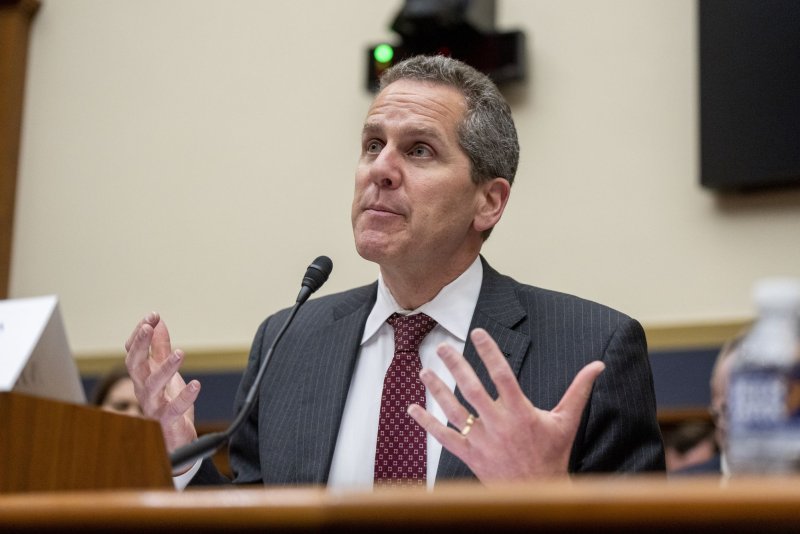1 of 3 | Michael S. Barr, vice chair for supervision of the Federal Reserve's Board of Governors, is among those testifying before a Senate committee about the sudden collapse of two banks in March. File Photo by Ken Cedeno/UPI |
License Photo
May 18 (UPI) -- Lawmakers focused on supervisory failures Thursday as they continue pressing Federal Reserve Vice Chair Michael S. Barr and other government officials in a Capitol Hill hearing on the U.S. banking industry.
Barr and Federal Deposit Insurance Corp. Chairman Martin J. Gruenberg were among six regulators summoned before the Senate Committee on Banking, Housing and Urban Affairs, which is holding its third hearing of the week on the March collapse of Silicon Valley Bank in California and New York-based Signature Bank.
National Credit Union Administration Chairman Todd Harper; acting comptroller of the currency Michael Hsu; New York's superintendent of financial services Adrienne Harris; and Clothilda Hewlett, commissioner of the California Department of Financial Protection and Innovation, also appeared for Thursday's hearing.
"My review of Silicon Valley Bank's failure demonstrates that there are weaknesses in regulation and supervision that must be addressed, and I am committed to doing so," Barr told the panel during his opening remarks.
"Let me be absolutely clear: I accept full responsibility with respect to the supervisory failings at the Federal Reserve," he said in response to questioning from ranking member Sen. Tim Scott, R-S.C.
However, Barr said he was "sensitive" to making any changes during the current economic environment.
Regulators seized control of both institutions within days in March, shortly after Silvergate Bank, a major crypto lender, announced it would voluntarily wind down its assets.
Questioned by Sen. Jack Reed, D-R.I., Barr acknowledged that SVB failed a bank stress test that measures its available liquidity. It then revised the parameters and passed on a subsequent attempt.
The later failures of First Republic Bank and PacWest Bancorp in May raised even greater concerns about the strength of the nation's banking system amid soaring inflation and rising interest rates.
Barr drew criticism after acknowledging no Federal Reserve supervisors have lost their jobs, even though he pointed to supervisory failures as an issue.
"We have not fired someone as a result of this review. We plan to conduct further review of our supervisory structure, and as we do that, we'll be making sure we have the right personnel in place to get the job done," Barr said.
Scott pushed back against that narrative from the start of the hearing.
"There's nothing further from the truth than that concept, that you did not have the legislative power necessary to do your jobs. That's just false," Scott told the panel.
"The supervisors had the ability to enforce the regulatory regime to keep America's financial institutions safe. They just, you did not, use the tools in the toolbox to do the job that was necessary."
Barr told the committee SVB's board and management failed to properly identify risks in the midst of exponential growth, while at the same time Federal Reserve supervisors did "not fully appreciate the extent of the vulnerabilities as SVB grew in size and complexity."
The bank's assets ballooned over a short period of time beginning in 2019, while the uninsured portion of those deposits remained at about 90%.
"When supervisors did identify vulnerabilities, they did not take sufficient steps to ensure that the bank fixed those problems quickly enough," Barr said, outlining his theory behind the collapse of the two banks.
On Tuesday, under questioning by the same Senate committee, the former executives of two failed banks blamed "unprecedented" events for the failure of their respective institutions.
Former Silicon Valley Bank CEO Greg Becker told the committee that the failure of Silvergate Bank led to misconceptions that contributed to SVB becoming the first FDIC-insured bank to fail in more than two years when it was closed by the California Department of Financial Protection.
The hearing also comes a day after Sen. Elizabeth Warren, D-Mass., sent a letter to Gruenberg and other regulators about the "deeply troubling" deal that would transfer the failed First Republic to JPMorgan Chase for $2.6 billion, while the FDIC's Deposit Insurance Fund would be left to cover $13 billion in losses.
"Without a complete regulatory review, and at a cost of $13 billion to the Federal Deposit Insurance Fund, the nation's biggest bank -- already too big to fail -- got a bargain deal on a failing bank that made it even bigger," Warren wrote.
Small and midsize banks throughout the nation came under pressure during the first quarter of 2023 because of their over-reliance on volatile cryptocurrencies, while other banks failed amid a contagion of fear as rumors and misconceptions spread over the Internet.
A review by the Federal Reserve Board in April found Silicon Valley Bank failed due to a "textbook case of mismanagement" by its leadership, whose oversight was impeded by "reducing standards, increasing complexity and promoting a less assertive supervisory approach."
Barr reiterated that narrative Tuesday.
"The board's tailoring approach impeded effective supervision by reducing standards, increasing complexity, and promoting a less-assertive supervisory approach," he told the committee.
According to the review, while Silicon Valley Bank was growing rapidly from 2019 to 2021, it went from $71 billion to over $211 billion in assets and was not subject to heightened Fed supervisory or regulatory standards.
Treasury Secretary Janet Yellen has continued to express confidence in the nation's banking system in her own testimony before the Senate Finance Committee that reassured depositors their money would be safe following the collapses.















